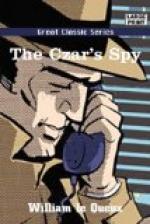“Perhaps you will kindly mend my passport, and give it a proper vise.”
In an instant he was up from his chair, and having gathered the torn paper from the floor, proceeded to paste it together. On the back he endorsed that it had been torn by accident, and then gave it the proper vise, affixing the stamps.
“I trust, Excellency,” he said, bowing low as he handed it to me, “I trust that this affair will not trouble you further. I assure you I had no intention of insulting you.”
“Yes, you had!” I said. “You insulted me merely because I am English. But recollect in future that the man who insults an Englishman generally pays for it, and I do not intend to let this pass. There is a higher power in Finland than even the Governor-General.”
“But, Excellency,” whined the fellow who only ten minutes ago had been such an insulting bully, “I shall lose my position. I have a wife and six children—my wife is delicate, and my pay here is not a large one. You will forgive, won’t you, Excellency? I have apologized—I most humbly apologize.”
And he took up the letter I had given him, holding it gingerly with trembling fingers. And well he might, for the document was headed:
“MINISTER OF THE IMPERIAL HOUSEHOLD, PALACE OF PETERHOF.
“The bearer of this is one Gordon Francis Gregg, British subject, whom it is Our will and command that he shall be Our guest during his journey through our dominion. And we hereby command all Governors of Provinces and minor officials to afford him all the facilities he requires and privileges and immunities as Our guest.”
The above decree was in a neat copper-plate handwriting in Russian, while beneath was the sprawling signature of the ruler of one hundred and thirty millions of people, that signature that was all-powerful from the gulf of Bothnia to the Pacific—“Nicholas.”
The document was the one furnished to me a year before when, at the invitation of the Russian Government, I had gone on a mission of inquiry into the state of the prisons in order to see, on behalf of the British public, whether things were as black as some writers had painted them. It had been my intention to visit the far-off penal settlements in Northern Siberia, but having gone through some twenty prisons in European Russia, my health had failed and I had been compelled to return to Italy to recuperate. The document had therefore remained in my possession because I intended to resume my journey in the following summer. It was in order that I should be permitted to go where I liked, and to see what I liked without official hindrance, that his Majesty the Emperor had, at the instigation of the Ministry of the Interior, given me that most valuable document.
Sight of it had changed the Chief of Police from a burly bully into a whining coward, for he saw that he had torn up the passport of a guest of the Czar, and the consequence was most serious if I complained. He begged of me to pardon him, urging all manner of excuses, and humbling himself before me as well as before his two inferiors, who now regarded me with awe.




